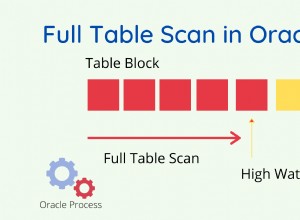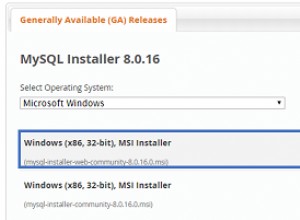अपडेट 5 दिसंबर, 2011
ब्रैड रॉबर्टसन और उनकी टीम के लिए धन्यवाद, वहाँ है अपार्टमेंट रत्न . यह बहुत उपयोगी है और भारी भारोत्तोलन करता है।
हालांकि, अगर आप स्कीमा के साथ छेड़छाड़ कर रहे हैं, तो मैं दृढ़ता से सुझाव देता हूं कि यह वास्तव में कैसे काम करता है। Jerod Santo's walkthrough से खुद को परिचित करें , ताकि आप जान सकें कि अपार्टमेंट रत्न कमोबेश क्या कर रहा है।
अपडेट अगस्त 20, 2011 11:23 GMT+8
किसी ने एक ब्लॉग पोस्ट बनाया है और इस पूरी प्रक्रिया के बावजूद अच्छी तरह से चलता है।
अपडेट 11 मई 2010 11:26 GMT+8
कल रात से मैं काम करने के लिए एक विधि प्राप्त करने में सक्षम हूं जो एक नया स्कीमा बनाता है और इसमें schema.rb लोड करता है। सुनिश्चित नहीं है कि मैं जो कर रहा हूं वह सही है (अब तक ठीक काम करता प्रतीत होता है) लेकिन यह कम से कम एक कदम करीब है। अगर कोई बेहतर तरीका है तो कृपया मुझे बताएं।
module SchemaUtils
def self.add_schema_to_path(schema)
conn = ActiveRecord::Base.connection
conn.execute "SET search_path TO #{schema}, #{conn.schema_search_path}"
end
def self.reset_search_path
conn = ActiveRecord::Base.connection
conn.execute "SET search_path TO #{conn.schema_search_path}"
end
def self.create_and_migrate_schema(schema_name)
conn = ActiveRecord::Base.connection
schemas = conn.select_values("select * from pg_namespace where nspname != 'information_schema' AND nspname NOT LIKE 'pg%'")
if schemas.include?(schema_name)
tables = conn.tables
Rails.logger.info "#{schema_name} exists already with these tables #{tables.inspect}"
else
Rails.logger.info "About to create #{schema_name}"
conn.execute "create schema #{schema_name}"
end
# Save the old search path so we can set it back at the end of this method
old_search_path = conn.schema_search_path
# Tried to set the search path like in the methods above (from Guy Naor)
# [METHOD 1]: conn.execute "SET search_path TO #{schema_name}"
# But the connection itself seems to remember the old search path.
# When Rails executes a schema it first asks if the table it will load in already exists and if :force => true.
# If both true, it will drop the table and then load it.
# The problem is that in the METHOD 1 way of setting things, ActiveRecord::Base.connection.schema_search_path still returns $user,public.
# That means that when Rails tries to load the schema, and asks if the tables exist, it searches for these tables in the public schema.
# See line 655 in Rails 2.3.5 activerecord/lib/active_record/connection_adapters/postgresql_adapter.rb
# That's why I kept running into this error of the table existing when it didn't (in the newly created schema).
# If used this way [METHOD 2], it works. ActiveRecord::Base.connection.schema_search_path returns the string we pass it.
conn.schema_search_path = schema_name
# Directly from databases.rake.
# In Rails 2.3.5 databases.rake can be found in railties/lib/tasks/databases.rake
file = "#{Rails.root}/db/schema.rb"
if File.exists?(file)
Rails.logger.info "About to load the schema #{file}"
load(file)
else
abort %{#{file} doesn't exist yet. It's possible that you just ran a migration!}
end
Rails.logger.info "About to set search path back to #{old_search_path}."
conn.schema_search_path = old_search_path
end
end




